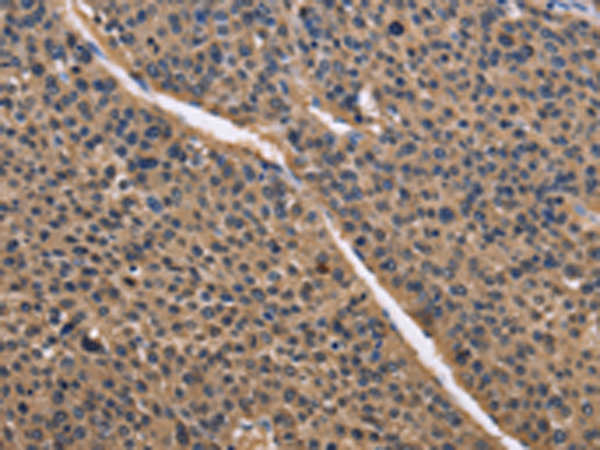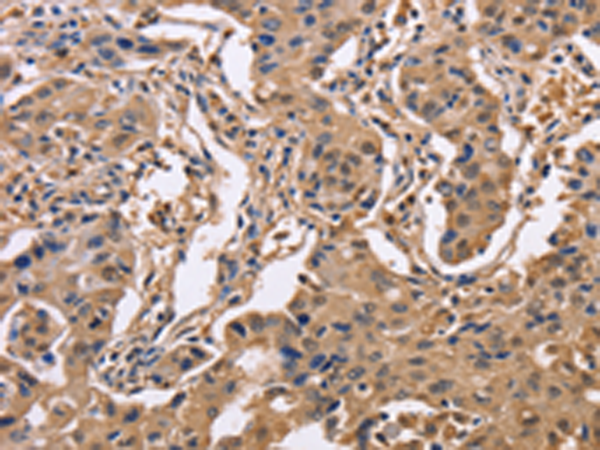


| WB | 咨询技术 | Human,Mouse,Rat |
| IF | 咨询技术 | Human,Mouse,Rat |
| IHC | 1/50-1/200 | Human,Mouse,Rat |
| ICC | 技术咨询 | Human,Mouse,Rat |
| FCM | 咨询技术 | Human,Mouse,Rat |
| Elisa | 1/1000-1/5000 | Human,Mouse,Rat |
| Aliases | IDH; IDP; IDCD; IDPC; PICD |
| WB Predicted band size | 47 kDa |
| Host/Isotype | Rabbit IgG |
| Antibody Type | Primary antibody |
| Storage | Store at 4°C short term. Aliquot and store at -20°C long term. Avoid freeze/thaw cycles. |
| Species Reactivity | Human, Mouse, Rat |
| Immunogen | Fusion protein of human IDH1 |
| Formulation | Purified antibody in PBS with 0.05% sodium azide and 50% glycerol. |
+ +
以下是3篇关于IDH1抗体的代表性文献(简略版):
1. **文献名称**:IDH1 mutations are present in the majority of common adult gliomas
**作者**:Yan H, et al.
**摘要**:首次发现IDH1 R132突变在胶质瘤中的高频存在,并开发特异性抗体用于突变蛋白检测,为胶质瘤分子分型提供重要工具。(NEJM, 2009)
2. **文献名称**:Antibody-based detection of mutant IDH1 in glioma
**作者**:Capper D, et al.
**摘要**:验证了IDH1 R132H突变特异性抗体(克隆 H09)在石蜡包埋组织中的诊断价值,证明其与DNA测序结果高度一致。(Acta Neuropathol, 2010)
3. **文献名称**:Type and frequency of IDH1 mutations in brain tumors
**作者**:Hartmann C, et al.
**摘要**:系统比较了不同IDH1抗体的检测性能,发现抗体对R132H突变特异性最高,而其他突变型需依赖测序检测。(Brain Pathol, 2010)
注:以上文献聚焦于IDH1抗体在肿瘤诊断中的临床转化应用,主要涉及突变特异性检测方法的建立与验证。如需基础机制研究相关文献可补充说明。
IDH1 antibodies are essential tools in cancer research and diagnostics, specifically targeting isocitrate dehydrogenase 1 (IDH1), a metabolic enzyme involved in cellular processes like the citric acid cycle and oxidative stress regulation. Wild-type IDH1 catalyzes the conversion of isocitrate to α-ketoglutarate (α-KG). However, somatic mutations in the IDH1 gene, particularly the R132H variant, are recurrent in cancers such as gliomas, acute myeloid leukemia (AML), and cholangiocarcinoma. Mutant IDH1 acquires neomorphic activity, producing the oncometabolite D-2-hydroxyglutarate (2-HG), which disrupts cellular epigenetics and promotes tumorigenesis.
IDH1 antibodies are widely used to detect mutant IDH1 protein expression in tumor tissues via immunohistochemistry (IHC), aiding in tumor classification, prognosis assessment, and differential diagnosis. For example, IDH1 R132H-specific antibodies help distinguish IDH-mutant gliomas from IDH-wild-type glioblastomas, which have distinct clinical outcomes. These antibodies also support research into IDH1's role in metabolic reprogramming, epigenetic dysregulation, and therapeutic targeting. Small-molecule inhibitors targeting mutant IDH1. such as ivosidenib, have been developed, further emphasizing the importance of IDH1 antibodies in validating target expression in preclinical and clinical studies. Their specificity and reliability make them indispensable for both diagnostic workflows and mechanistic investigations in oncology.
×